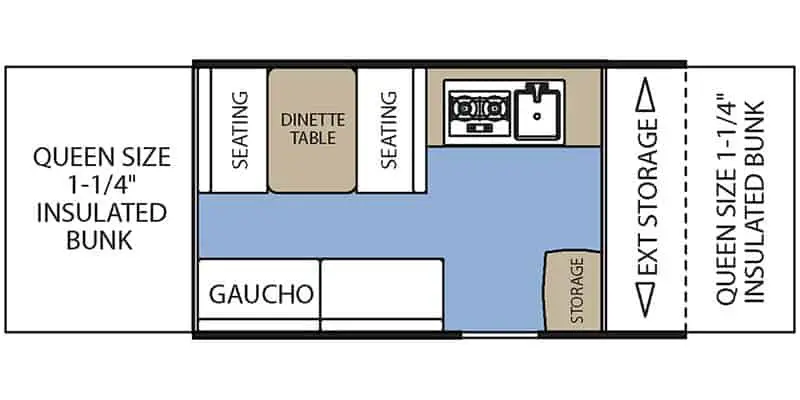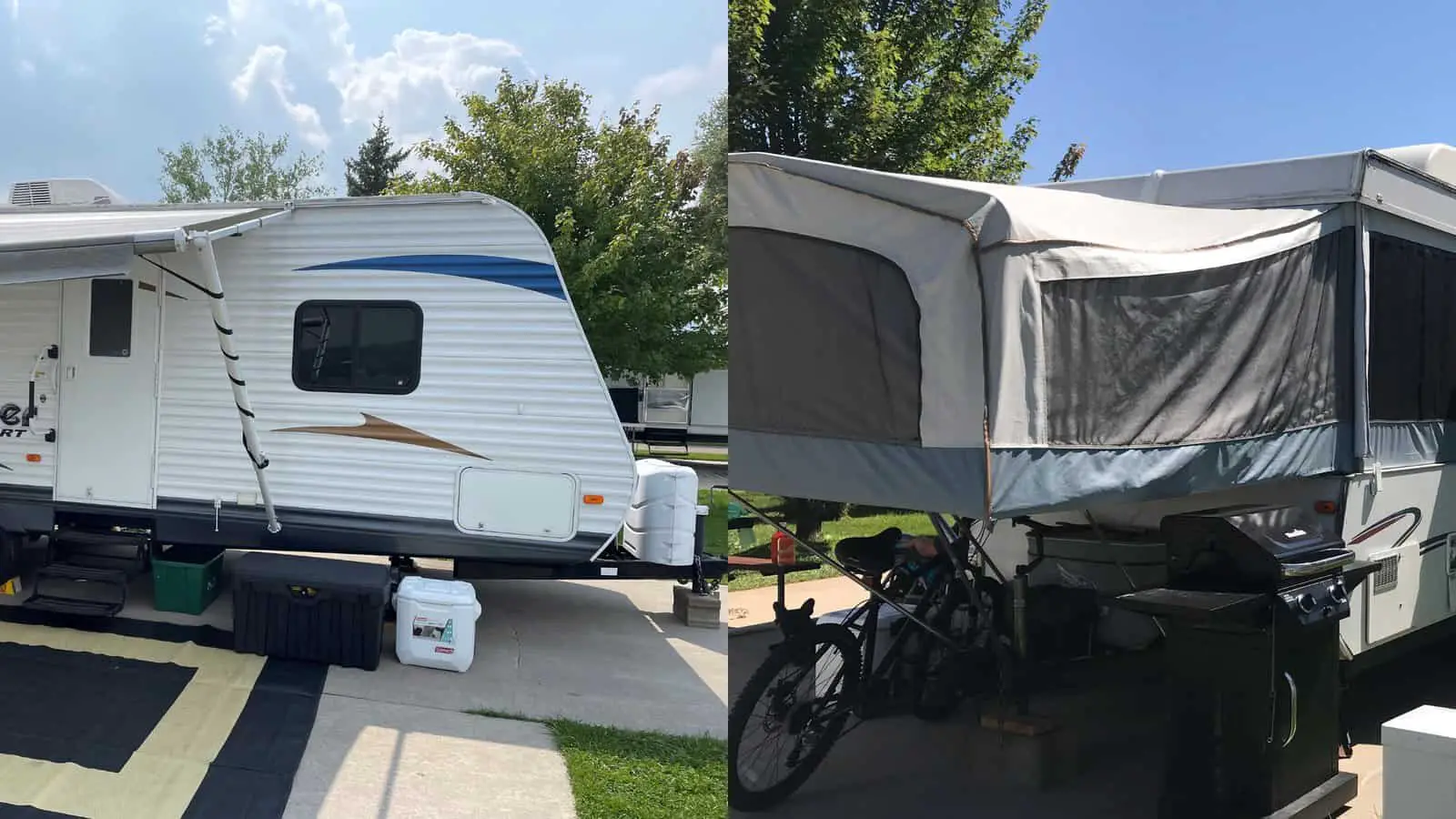When it comes to hitting the road for a memorable vacation, choosing the right RV can be overwhelming. In this article, we’re going to break down the advantages and disadvantages of two popular options: pop-up campers and travel trailers. We’ll explore the differences in weight, space, and functionality to help you make an informed decision.
Weight Considerations
Pop-up Campers: Light and Easy to Tow
Pros:
- Lighter weight: Pop-up campers typically weigh between 1,000 and 4,000 lbs, making them an excellent choice for smaller vehicles with limited towing capacity.
- Better fuel efficiency: Due to their lighter weight, you can expect better fuel economy when towing a pop-up camper.
Cons:
- Less insulation: Lighter materials used in pop-up campers mean less insulation, which could be a concern in colder climates.
Travel Trailers: Heavier but Feature-rich
Pros:
- More amenities: With additional weight comes the opportunity for more amenities, such as full bathrooms, larger kitchens, and entertainment systems.
Cons:
- Heavier: Travel trailers generally weigh between 3,000 and 12,000 lbs, making them more challenging to tow for smaller vehicles.
- Lower fuel efficiency: Due to their heavier weight, towing a travel trailer may result in lower fuel economy.
Space and Functionality
Pop-up Campers: Compact and Efficient

Pros:
- Compact design: Pop-up campers are designed to be compact and easy to tow, making them perfect for those who prioritize convenience and portability.
- Easier to store: Their smaller size means they are generally easier to store when not in use.
Cons:
- Limited living space: The compact design of pop-up campers means there is less living space compared to travel trailers.
Travel Trailers: Roomier with More Amenities

Pros:
- More living space: Travel trailers generally offer more space, allowing for more comfortable and spacious accommodations.
- Greater variety: There is a wide range of travel trailer sizes and styles to choose from, catering to different needs and preferences.
Cons:
- Larger footprint: Travel trailers often require more space for storage and may be more challenging to maneuver in tight spaces.
Cost and Maintenance
Another important aspect to consider when choosing between a pop-up camper and a travel trailer is the cost and maintenance involved.
Pop-up Campers: Affordable and Low Maintenance
Pros:
- Lower upfront cost: Pop-up campers are generally more affordable than travel trailers, making them an attractive option for budget-conscious travelers.
- Less maintenance: Due to their simpler design, pop-up campers usually require less maintenance compared to travel trailers.
Cons:
- Fewer amenities: The lower cost of pop-up campers means they may have fewer amenities than their travel trailer counterparts.
Travel Trailers: More Expensive but Feature-rich
Pros:
- Greater variety: Travel trailers offer a wide range of styles, sizes, and price points, making it easier to find one that fits your needs and preferences.
- Increased resale value: Travel trailers tend to hold their resale value better than pop-up campers due to their more substantial construction and added amenities.
Cons:
- Higher upfront cost: Travel trailers are generally more expensive than pop-up campers, both in terms of purchase price and ongoing maintenance costs.
- More maintenance: Travel trailers typically require more maintenance, such as winterizing and dealing with potential issues like water damage.
Ease of Setup and Takedown
An important factor for many RVers is the ease of setting up and taking down their mobile accommodations.
Pop-up Campers: Easy to Set Up but Requires Some Effort
Pros:
- Quick setup: Pop-up campers are designed for quick and easy setup, often taking only 15-30 minutes to fully assemble.
Cons:
- Manual effort: Setting up a pop-up camper generally requires some manual effort, such as cranking up the roof and extending the support poles.
Take a look at our article on: Step-by-Step Guide: Safely Raising and Repairing a Broken Pop-Up Camper
Travel Trailers: Minimal Setup but Requires Practice
Pros:
- Less manual effort: Travel trailers don’t require any assembly, as they are already fully built and ready to use.
Cons:
- Practice required: Hitching and unhitching a travel trailer can be challenging for beginners and may require some practice to become comfortable with the process.
Climate and Weather Considerations
When selecting between a pop-up camper and a travel trailer, it’s essential to consider the climate and weather conditions you’ll encounter during your adventures.
Pop-up Campers: Suitable for Mild Climates
Pros:
- Ventilation: Pop-up campers often have better ventilation due to their soft-sided walls and windows, making them ideal for warmer climates.
Cons:
- Less insulation: Pop-up campers have limited insulation, which may not be ideal for colder climates or extreme weather conditions.
Travel Trailers: Built for a Variety of Climates
Pros:
- Better insulation: Travel trailers generally have better insulation and sealed walls, making them more suitable for a wider range of climates and weather conditions.
- Weather-resistant: The solid construction of travel trailers can better withstand rain, wind, and snow compared to pop-up campers.
Cons:
- Potential for condensation: Travel trailers may be more susceptible to condensation issues due to their better insulation and sealed walls.
You enjoy our article on: (9 Steps) How To Insulate A Travel Trailer For Winter Use
Driving Experience
When towing an RV, the driving experience can vary significantly between a pop-up camper and a travel trailer.
Pop-up Campers: Easier to Tow and Maneuver
Pros:
- Better visibility: The lower profile of pop-up campers allows for better visibility when towing, making it easier to see traffic behind you.
- Easier to maneuver: Pop-up campers are generally more straightforward to maneuver and park due to their smaller size and lighter weight.
Travel Trailers: Heavier and Requires More Caution
Pros:
- Stable towing: Travel trailers can offer a more stable towing experience due to their heavier weight and lower center of gravity.
Cons:
- Reduced visibility: The larger size of travel trailers can limit visibility when towing, making it more challenging to see traffic behind you.
- More difficult to maneuver: Travel trailers are generally more challenging to maneuver, park, and back up due to their larger size and heavier weight.
The Verdict: Which One is Right for You?
Ultimately, the choice between a pop-up camper and a travel trailer comes down to your personal preferences and needs. Consider factors like towing capacity, space requirements, and desired amenities to determine which option best suits your lifestyle.
By considering factors like climate, weather, driving experience, and your personal preferences, you can make an informed decision between a pop-up camper and a travel trailer. Don’t forget to explore the resources mentioned earlier for more detailed information on each type of RV:
No matter which option you choose, the most important thing is to enjoy the journey and create lasting memories along the way.
Good luck, and happy camping!
Check out our article on: How to Choose the Right Travel Trailer for Your Family’s Needs

